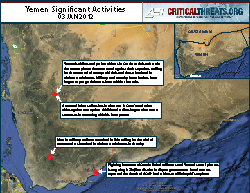 |
Yemen’s military and security forces, especially the Republican Guard and the Central Security Forces, have begun purging suspected defectors from their ranks. Additionally, Yemenis have begun what they term a “parallel revolution” – a wave of labor strikes – targeting corruption. These labor strikes have already had some success in removing from power corrupt individuals with close ties to President Ali Abdullah Saleh’s regime.
Yemen’s military and security leaders have cracked down on dissidents within their ranks. Saleh’s son, Ahmed, commander of the Republican Guard, has arrested dozens of Republican Guard members. He reportedly warned his troops against “copying” any protest movements. Saleh’s nephew, Yahya, has also reportedly detained soldiers within the Central Security Forces, which he commands. Other parts of the military have seen increased defections or acts of defiance. A military unit in Dhaleh locked its commanders out of the military installations, demanding the removal of corrupt officers and those who partook in violent repression of the protesters. Troops in Sana’a have also locked out officers, including locking out security chief Mohammed al Qawsi, who is related to Saleh, from the main security headquarters and police officers have staged sit-ins in the capital. Yemen’s defense minister ordered Ali al Shater, who headed the military publishing company Tawjih al Ma’anawi (Moral Guidance) and was close to Saleh, out of office. Troops also marched in Taiz demanding trials for commanders who oversaw violence against protesters.
Labor strikes demanding reform and an end to corruption have broken out across Yemen. The first successful strike by the pilots union at Yemenia Airways resulted in the suspension of the company’s director, Saleh’s son-in-law, on December 22. The strikes stopped all flights out of Sana’a and Aden. Workers at a Hudaydah cement factory, for example, sought the dismissal of the factory head for allegedly embezzling assets. The Associated Press reported that these strikes have occurred at 18 state agencies, including Yemen’s Military Economic Institution. The manager, a man from Saleh’s tribe, has been accused of paying civilians to attack protesters in the capital.
The offensive against al Qaeda-linked militants in Abyan governorate is continuing. Local sources reported that the death of al Qaeda in the Arabian Peninsula leader Nasser al Wahayshi’s nephew, Asem al Wahayshi, was announced in Jaar, along with the deaths of two others. Four militants were killed in al Husn building an explosive device. Clashes and shelling between Yemeni troops and the al Qaeda-linked militants, operating under the name Ansar al Sharia, occur regularly in Zinjibar city and in the surrounding areas.
Protesters continue to demonstrate across the country. Protests were held in at least 19 cities on December 30. Saleh supporters fired on a peaceful march from Taiz to Sana’a, the “Life March,” on December 24, killing at least nine people. This violence coupled with a comment from the U.S. Ambassador to Yemen Gerald Feierstein that said the march was aimed at creating “chaos and violence” sparked additional protests. Activists accused the U.S. of looking the other way when the Yemeni regime committed acts of violence. Additional peaceful marches occurred, including one from Aden to Zinjibar that was stopped by al Qaeda-linked militants in al Kod.
← Previous |
Next → |
